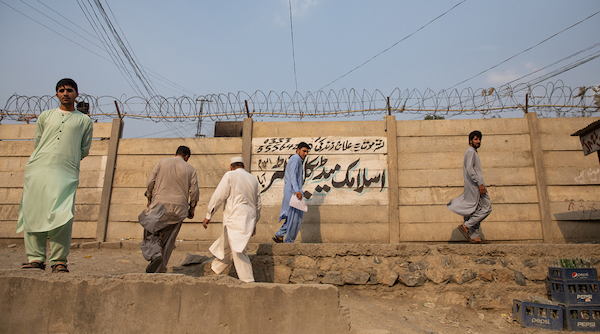
Men walk near the Torkham border crossing between Afghanistan and Pakistan in Pakistan, on September 28, 2021. (Via Foreign Policy)
Pakistan has refused to accept new batches of Afghan refugees since the Talibanís takeover of the war-ravaged South Asian country in August, a report in an American news publication reveals.
Foreign Policy (FP), in a report published on Tuesday, said Pakistan, which has accepted nearly 3.5 million Afghans over the past three decades, has "pushed back against new arrivals from Afghanistan."
It says the Pakistani authorities have tightened the countryís border control and deported some people who attempted to cross over without legal documents in recent months.
According to the report, the new measures adopted against fresh Afghan arrivals indicate "the fears of a state burdened by the cost of hosting refugees and paranoid about its national security."
About 28,000 people have arrived in Pakistan from Afghanistan since the start of the year, according to the United Nations High Commissioner for Refugees (UNHCR).
The FP report said most of them likely entered Pakistan after the Taliban took control of Afghanistan in August, with no official statistics of arrivals in the last three months.
Since August, when the US-led coalition forces beat a hasty retreat from the country, allowing the Taliban to take over Kabul, a new wave of refugees have left for Pakistan as well as Iran, the two biggest hosts of the worldís refugee population
In September, Pakistanís Interior Minister Sheikh Rasheed Ahmad said his country would not set up new refugee camps, in an indication that the Pakistani government was not prepared to take in more refugees from across the border.
According to the FP, Pakistanís policy towards new arrivals has been ambiguous and only few official statements regarding the issue have been made so far.
"Nobody knows what the policy is," Afrasiab Khattak, a veteran Pakistani politician and former senator, is quoted as saying, adding "Afghans are being thrown to the wolves."
íVery serious pressuresí
According to refugee rights advocates, Pakistanís lack of policy on new Afghan arrivals has made it difficult for aid groups to support them, pushing the refugees to rely on informal networks in the communities they settle in to meet their basic needs.
"This time, the situation is a bit different, and there is chaos for humanitarian organizations," Rukhshanda Naz, a board member of a civil society group, Womenís Regional Network, is quoted as saying in the report.
Pakistan hasnít registered new refugees since 2007, and the United Nations High Commissioner for Refugees, which is issuing certificates that recognize new arrivals as asylum-seekers, is still negotiating with the Pakistani government about their rights, the report stated.
"We are under very serious pressures," Tammi Sharpe, a UNHCR representative, said during a panel last week about the unfolding crisis in the country.
The FP report also said that undocumented Afghans in Pakistan, which is not a party to the 1951 Refugee Convention and has no domestic asylum laws, "have limited access to work, housing, and education, and without legal protections, they are targets of discrimination and harassment by law enforcement."
The report also referred to growing anti-refugee sentiment in the country, saying some provinces have in recent months penalized local residents who host Afghans.
Taliban announced the formation of a caretaker government on September 7, but the groupís efforts to bring peace and normalcy have so been undermined by US sanctions, as banks are running out of cash and civil servants are going unpaid.
The new rulers have warned Western diplomats that insisting on sanctions as a means to pressure their governance could undermine security and trigger a fresh wave of economic refugees.
Taliban first ruled Afghanistan from 1996 to 2001, when the United States and its allies invaded the country and toppled the Taliban-run government on the pretext of fighting terrorism.
However, the 20-year long military occupation of the country only brought misery to the war-weary people and destroyed their lives and livelihood.
LINK: https://www.ansarpress.com/english/24130
TAGS:






























 Farkhunda Buried, Ghani Appoints Fact-Finding Team
Farkhunda Buried, Ghani Appoints Fact-Finding Team




